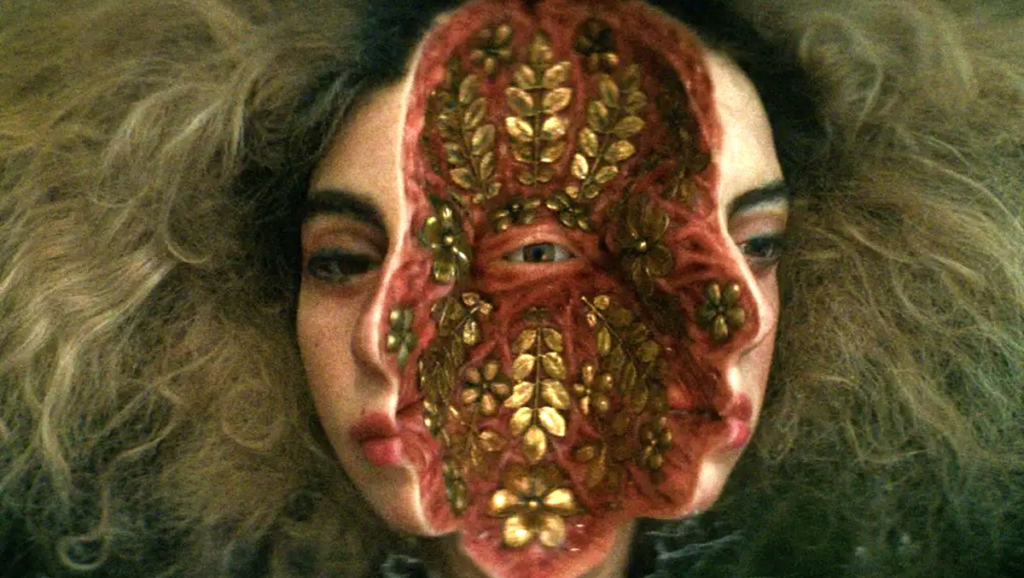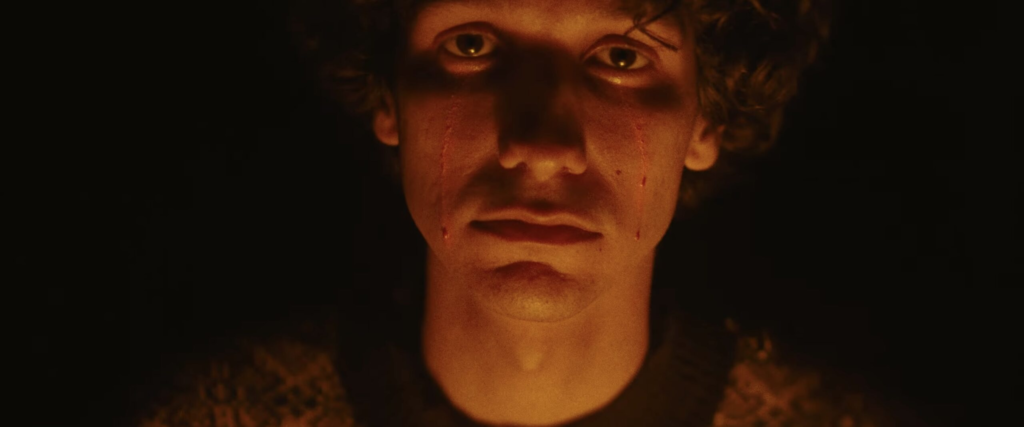Director: Yannis Veslemes
Writers: Dimitris Emmanouilidis, Yannis Veslemes
Stars: Dominique Pinon, Julio Katsis, Panos Papadopoulos
Synopsis: Three brothers build an unusual time-machine in order to bring their long-dead mother back to life.
Two things come to my mind when thinking about the “Greek Weird Wave”. The first, is critically and commercially beloved Greek auteur Yorgos Lanthimos. The second is my gratitude. As a cinephile, there’s nothing better than having the ability to explore the entire world, and time itself, through film. So as a Greek, with Lanthimos being my real introduction to Greek cinema, it allowed me to see my country of Greece in all the years I hadn’t been able to make a return visit. I’ve since changed that, but going back to Greece, and the rising prominence of Lanthimos’ career, has only fueled my desire to devour more of Greek cinema. Enter She Loved Blossoms More, Yannis Veslemes’ drug-addled journey into, and eventually through, grief. And remaining true to the stylistic wave of films mentioned earlier, Veslemes’ film is as weird as can be. But it avoids being weird merely for the sake of shock, and is not without its earned merit when it comes to capturing a distinct on-screen vision.

The film doesn’t so much open as much as it just throws the viewer into the fray. We see three men, who are quickly discovered to be brothers, living together. We barely see the entire house they’re in, but you get the sense that it’s massive. It’s also clearly dilapidated. It’s the type of oversized house that, if you’d pass by it as a kid, your brain could only imagine the most shocking of horrors and mad science that’s happening within. This thought burrowed its way into my brain early on in the film, and from there it only expanded, thanks to Veslemes’ commitment to style and tone. And this thought wouldn’t be an unfounded one if looking from the outside in. By the time we are introduced to these brothers, they’re clearly operating on the level of mad scientists. Hedgehog (Panos Papadopoulos), Dummy (Julio Katsis), and Japan (Aris Balis) are clearly skilled. They have the ability and wherewithal to build a makeshift laboratory in the name of their objective. What they’re doing should be impossible, but by the time we meet them, they’re on the verge of something equal parts marvelous and frightening. But even so, these three are clearly struggling to take care of their most basic necessities.
For example, cooking falls to Dummy. He pulls mystery meat out of the freezer, unsure not only of what it is, but when it was from. He barely hears the criticisms his brothers fling at the poor taste and even worse smell. The three are going through something major. They have lost their mother, who is seemingly buried in the backyard. Coping with such a loss has channeled their focus into a single task. The only thing that seems to sidetrack them is the copious amount of drugs they consume. It’s in this barrage of drug usage that Veslemes is able to capitalize on what makes She Loved Blossoms More a stand-out genre flick. One only needs to take count of just how many disparate elements come together to form something unique. The opening credits play over imagery that brings gritty, dystopian sci-fi to mind. We see built hardware that appears to have been thrown together with whatever scrap was around. Then the score, also by Veslemes, kicks in, playing out in ways that resembles what a hyperactive mind would conjure up when reading a mystery novel. It’s music that would play in the lair of a villain in a B-movie. There’s filmic-inspired footage intercut throughout the film, with heavy film grain brushing up sharply against the active digital imagery that makes up everything else. This footage is used sparingly, but it’s certainly effective. There are practical effects all throughout that blend in nicely with the psychedelic digital trickery on display. Veslemes throws a lot at his audience. But it’s in this disarray that his thesis appears to take shape.
With constant distortions blurring across the screen and such stylistic choices meshing together, it’s made abundantly clear how fractured the minds of these individuals are. If the drugs they’re taking to numb their grief isn’t enough, their singular focus is all that’s propelling them through it. The work in question? Building a machine that can bring their mother back to life. And this machine just so happens to be built from the shell of their mothers large wardrobe, still full of the clothes she left behind. Is this a way for the filmmakers to save some money on building an entire contraption? It’s possible. Yet Veslemes’ film makes many pointed comments that directly link the grief these brothers are feeling to the wardrobe itself. The pain they feel is palpable, and any viewer can sympathize with the lengths to which they are going. To see items once owned or used by those who are no longer with us carries massive impact. “It’s just a closet” is said at least twice in the film. In both distinct instances, the response is the same: “It’s more than that.” But in both sequences, the meaning behind these exchanges is flipped. In the first, it serves as the idea that yes, this is a machine that can actually bridge the gap between space and time. But the second meaning is far more potent. It’s not just a closet. It’s not just a machine they built either. It’s their mom’s closet, full of memories ingrained within the fibers of each thread of each article of clothing. We remember those who are no longer with us by what they leave behind.

I mentioned the use of filmic photography earlier. Most commonly associated with home movies, the film gauge looks like 16mm. In particular, it evokes a certain sense of nostalgia. And in She Loved Blossoms More, Veslemes uses it in such a way that appears to distort time itself. Hedgehog finds himself aimlessly meandering around the house, and we follow him through the lens of a handheld film camera. It’s as if we’re witnessing something we shouldn’t have access to. We’re watching a child grieve for his mother. It’s in deeply painful or anxiety-inducing moments when we may feel outside of ourselves. And through this camera, the film scarily captures an out-of-body experience. These brothers, however brilliant they may actually be, are still on a quest that will likely end in folly. Yet they find themselves caught in the hubris of their own efforts. For even the most brilliant mind there is, some forces are too cryptic to ever be understood. They most certainly cannot be altered or reverted. In grief, we may find ourselves obsessed over simple ideas. The most universal idea of all sets these brothers off on their path: they want to bring their mother back. It appears to be a vicious cycle. These brothers are not the only ones caught in it.
Throughout all of time, there are those who have lost loved ones. It’s as if history is an endless loop of grief. And everybody will surely react in their own way. Can the loop ever be broken? When thinking about the answer to that question, I return to one of the first lines spoken in the film: “I remain optimistic about the future.” It may not provide a concrete answer, but there’s certainly hope in knowing that one way or another, we always find our way through to happier days lived in memory of those who are no longer with us. If we hold onto those objects and those memories of our loved ones, we are bound to get through the roughest patches of grief. For as creepy and off-putting as She Loved Blossoms More can be at times, there’s hope to be found among even the most upsetting of places.
She Loved Blossoms More celebrated its world premiere at the Tribeca Film Festival in the Escape from Tribeca section. Tickets for screenings and more information on the film can be found right here.





